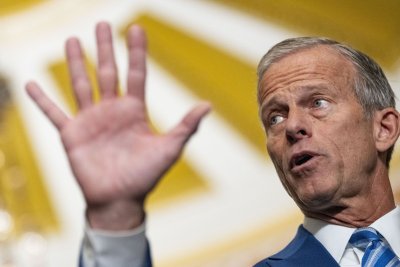Day 17 of shutdown: Senators mull legality of shifting military funds

Oct. 17 (UPI) — The federal shutdown will last at least a few more days as the Senate expects to hold no votes until Monday. Meanwhile, lawmakers are questioning the legality of how the Trump administration plans to pay the military.
Senate Republican leader John Thune of South Dakota sent senators home for the weekend, so the government will stay closed. The Senate will return at 3 p.m. Monday.
Three Democrats have voted for the Republican bills to reopen the government, but five more are needed to reach the 60 votes needed to pass the stopgap funding bill.
Meanwhile, some Republican senators are questioning the legality of President Donald Trump‘s move to shift Defense Department funds to pay for military paychecks during the shutdown.
They say they’re glad the service members are getting paid, but aren’t sure where the funds are coming from and whether the money shift is legal.
Normally, the White House would need to ask Congress to reappropriate federal funding, then the Appropriations Committee must approve it before moving funds around.
Senators interviewed by The Hill say they aren’t aware of any requests. Trump ordered Secretary of Defense Pete Hegseth to use “all available funds” to ensure troops got their paychecks.
“That’s a concern of not just appropriators, it seems broader than that,” an unnamed Republican senator told The Hill.
The lawmaker said Republican colleagues have asked the administration for more information about exactly which funds are getting shifted and what legal authority the White House is using to justify its action.
Senate Appropriations Committee Chairwoman Sen. Susan Collins, R-Maine, said she wants more information from the White House.
“We’ve been given two different explanations. One, is that it’s unobligated balances. One, is that it’s taken from certain research and technology programs. But we don’t have the specifics. We have asked for the specifics,” Collins said.
Alaska’s Republican Sen. Lisa Murkowski said: “I get that they say for the military pay for this pay period it comes out of … research and development technology [fund] but where? Is that taking it from projects that we have already identified? Maybe something’s really important to me. Where’s it coming from? We haven’t seen that,” she said.
On Wednesday, Trump signed a memo expanding his administration’s authority to repurpose unspent funds to pay service members during the shutdown.
Rep. Jim Himes, D-Conn., said Trump’s reallocation of funds was, “probably not legal.” On Face the Nation on Sunday, he said the “White House’s understanding of United States law” was “pretty tentative to say the best.”
